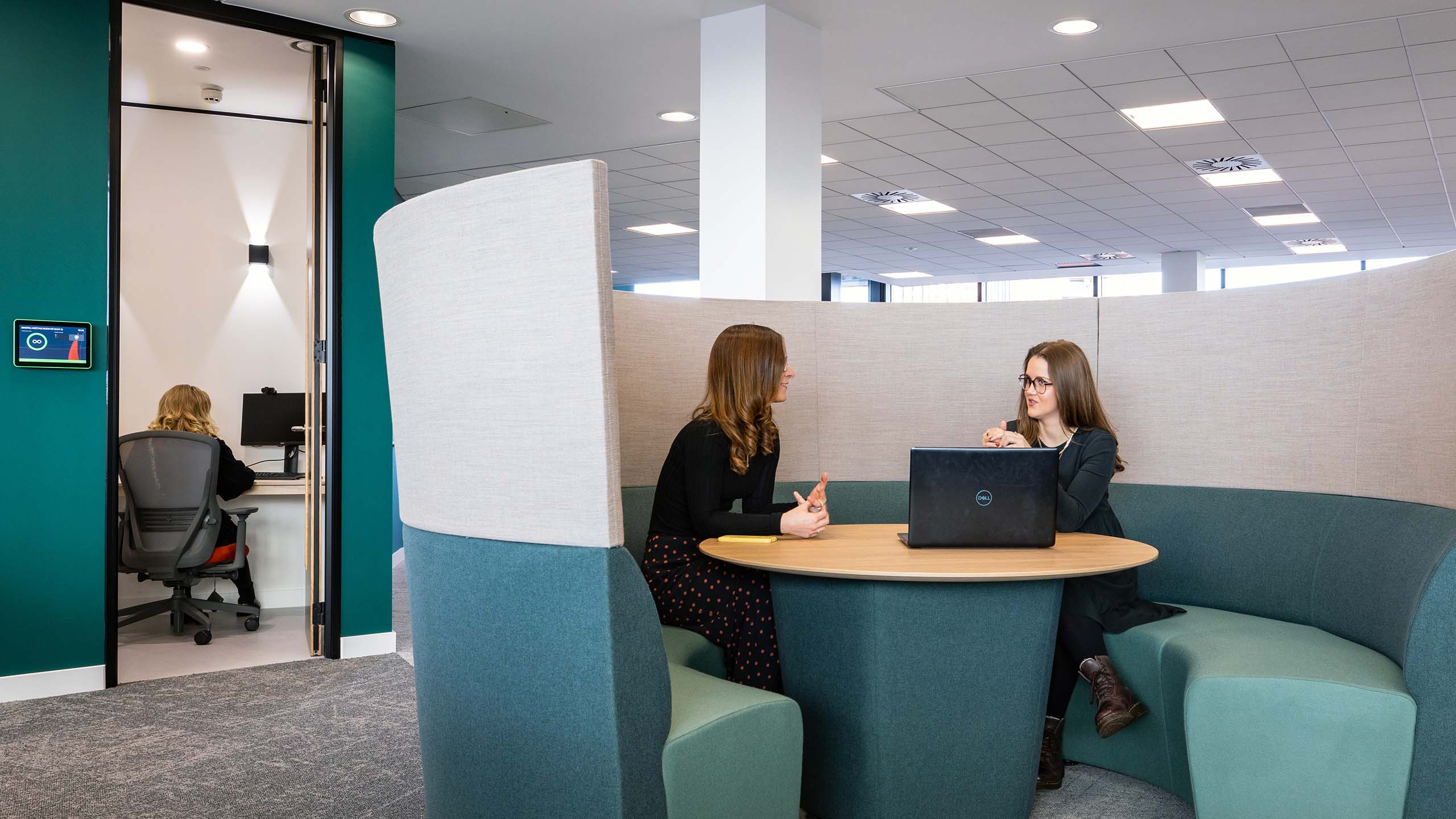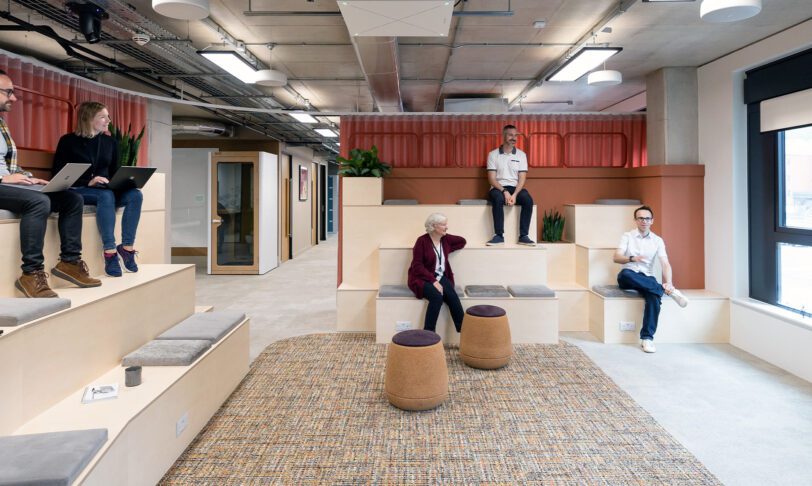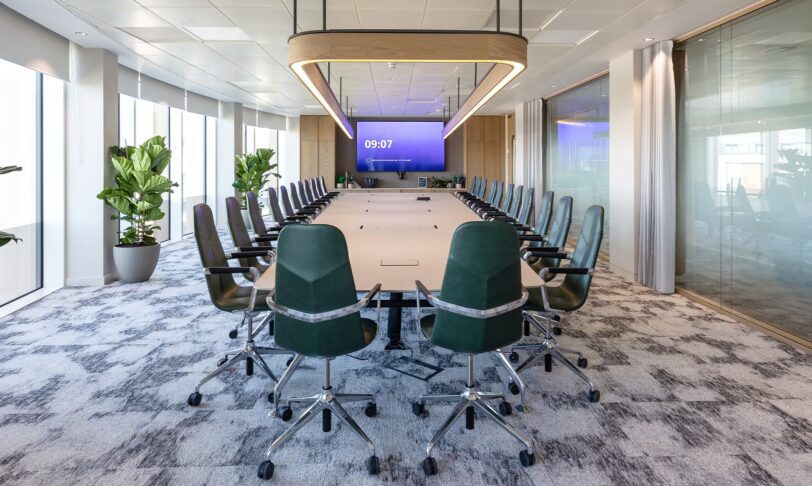What do Gen Z want from the workplace?
The workforce is becoming increasingly age-diverse. Currently making up 20% of the workforce, Gen Z’s influence will continue to grow. It’s important we understand their unique needs in order to create the best possible work environments for everyone.
This article looks at the characteristics of the ‘typical’ Gen Z employee to provide recommendations on how businesses can meet the needs of all generations in the workplace.
Understanding complex generational differences
Conventional wisdom says if you’re a Gen-Z, you’re a digital nomad running a TikTok account as a side hustle, you prefer to avoid all social contact (unless it’s an Insta DM) and you never intend to step foot in an office. Of course, if you’re a Baby Boomer (those born between 1946 and 1964), you live at work, can’t text and refuse to tolerate change.
Evidently, as workplaces become increasingly age-diverse, we are overgeneralising the generations; a behaviour which is likely to drive wedges among co-workers, generate miscommunication and hinder organisational progress.
The theory of generational differences suggests that the period in which you grow up or enter the job market has a lasting influence on your behaviour, life choices, attitudes, and priorities. It’s presented as a simple concept – there are a small number of generations, all of which have a fixed list of characteristics. But in grouping people by generation, we narrow a broad range of individuals into a handful of categories, leading to “insights” that are often wildly inaccurate. In turn, this can have serious implications on how we treat and manage others, as well the organisational policies we design to cater to these stereotypes.
In fact, even showing generational differences is complex – because really, it’s about the interaction between two distinct factors; how society changes over time and how people change as they age.
Nonetheless, the way in which Gen Z, Gen X, Gen Y and Boomers approach the workplace is a hot topic – and it can’t be denied that there are indeed some broad differences when it comes to how, why and where these quickly labelled demographics want to “go to work”.
Gen Z: What the research shows
Certainly, many organisations are asking how they should best organise to attract, train and retain the best up-and-coming talent, specifically when it comes to Generation Z, the demographic just entering the workplace.
As of 2020, Gen Z made up 20% of the workforce. This is a generation comprising of individuals born around the years between 1995 and 2015 and typically defined by an assumed (and stereotypical) generational personality. This is also a generation that has been notoriously overlooked by businesses leaders and organisations alike, often getting clubbed together alongside their millennial counterparts.
So, whilst remaining mindful that everyone is uniquely individual, what are the likely characteristics that have been witnessed of a ‘typical’ Gen Z employee?
Gen Z are the first true Digital Natives
Firstly, the significant intertwining of technology in the up-bringing of every Gen-Zeder has considerably impacted how these individuals think, connect, learn, communicate, seek information and navigate the world. It is without a doubt that younger employees tend to have greater digital knowledge; the first generation to be true “digital natives”.
So, what does this mean for the workplace and business leaders? Organisations should view this with a positive lens and endeavour to make use of this ‘digital’ advantage. From a training perspective, Gen Zeders appear to learn better through soundbites and digital interfaces. David and Jonah Stillman’s research (authors of ‘Gen Z at Work’) suggests that video is in fact the most popular (and effective) learning tool alongside other digital mediums such as podcasts and audiobooks. In turn, this generation also tend to prefer a mixture of experiential and intrapersonal learning methods, where they can make use of these digital resources at their own pace and gear learning toward personal preferences. Often, Gen Z will also make use of their mobile phones as a resource (as opposed to using them as a distraction at work), which is something colleagues would benefit from being mindful of.

Gen Z are in “survival mode”
Research has shown that if you’re born into Gen Z, you’re more likely to be risk averse, less prone to alcohol abuse (according to BMC’s Public Health report), and more concerned with academic performance and your long-term career prospects than the generations who came before you. Moreover, as Megan Gerhardt’s research at University of Miami has shown, given the significant global events that have occurred during the formative years of a Gen Zeder’s life (such as 9/11 and the 2008 recession), this group are very much aware of potential economic fragility and therefore appear to be a generation of collectively driven and hard-working individuals, operating in more of a ‘survival’ mode with a potentially more grounded mentality than their older workplace colleagues. And this is something of which has most recently been compounded by the Covid19 pandemic and its effects on the economy, job security and future prosperity.
This is of course, particularly good news for employers but nonetheless, this typically ambitious work ethic does not mean Gen Z will necessarily tolerate long working hours, a lack of recognition and inflexibility. Rather, surveyed Gen Zeders have said that they prefer to manage their work and professional lives to fit their needs and interests, desiring to work in an ever-changing and fluid environment. Receiving acknowledgement and career growth opportunities at work will also be prominent factors that help attract and retain younger employees to organisations. Lastly, despite an increase in desire for meaning and fulfilment in their work, Gen Zeders are still attracted by a competitive salary.

The importance of purpose, diversity and inclusion
Flexibility is also of upmost importance; Gen Zeders will not only prefer, but expect, a flexible, hybrid model of working throughout their careers. These days, younger employees are viewing work as a thing, not a place and as such, many are even seeking more full-time remote working opportunities. For those wanting to go to an office environment, once or twice a week may be enough, so long as the days spent in the office are collaborative, allow for meaningful workplace relationships to flourish and enable learning and knowledge transfer. It is also important that the office environment itself is as enticing as it can be, offering a diverse mix of spaces which facilitates all the above.

It too is vitally important for organisations to understand that Gen Z are the most diverse peer cohort the workforce has ever seen. Movements and events (the most recent example of which being Black Lives Matter) that have occurred during their lifetimes have had a significant impact on this generation’s values. As such, research has indicated that many Gen Z employees show an ardent desire to help organisations make an impact, often seeking work where they can make a positive difference as part of a fulfilling and purposeful career. This also means Gen Zeders highly value authenticity and honesty from their employers. ‘Workplaces that help’ will be popular targets for this generation.
Gen Z’s level-headedness and focus on their career comes at a cost however. As the recently published Telegraph article ‘The future of Gen Z’s mental health: How to fix the ‘unhappiest generation ever’ highlights how this generation suffer higher diagnoses of mental health problems, and sleep deprivation amongst many other negative health consequences, is a point in which prospective employers would do well to be aware of.
Lastly, a significant point raised in this year’s 2021 Work Trend Index Annual Report was that Gen Z view health and wellbeing as a vital and fundamental part of their lives; mentally, emotionally, physiologically, and spiritually. Workplace initiatives to address these areas and help them where they may be struggling are greatly valued.
Gen Z: what we overlook when we focus on generational demographics
Ultimately, it is still vitally important to facilitate the best possible work environment, regardless of an employees’ age.
The multiple generations across the workforce have a lot more in common than one might assume. The critical need for businesses is to be inclusive of all types of talent. Typically, older, and younger employees alike want many of the same things: flexibility, opportunities to learn, mentorship, respect, and fairness. Employers should create flexible strategies to accommodate the unique circumstances of employees’ career and life stages. Understanding the pressures and priorities, aspirations and fears of young professionals, to employees with children as well as those approaching retirement age would drastically improve the jobs they provide.
So, what else can business leaders and organisations do to meet the needs of all generations within the workforce going forward? Below are some suggestions:
- Company culture should strive to be welcoming and authentic. Organisations must celebrate diversity and commit to full inclusion
- Recognition is as important as reward – lots of apps/portals provide this (Mo, Perkbox, HiBob, ThanksBen)
- Operating a flexible work structure should be imperative; envisaging the workplace as an ecosystem of physical, virtual and social, rather than just a physical space
- Promote development opportunities and advancement paths
- Offer project-based work and intrapreneurial opportunities
- Provide opportunities for staff to make an impact (either through the likes of ESG and/or CSR initiatives, or by giving employees a chance to have a say in business decisions as an example)
- Actively promote and practice wellbeing initiatives
- Understand employee neurodiversity and design accordingly (neurodiversity refers to the different ways we think, including those employees with autism, ADHD and dyslexia). This in turn means that employees will naturally have different interests and motivations, and so will be naturally better at some things than others. Neurodiversity can be a competitive advantage when employees are in the right environment, making use of their strengths, instead of constantly trying to overcome challenges. To achieve this, we must create inclusive spaces to work.
- Practice ‘mutual mentoring’ (generations have different knowledge to share-wisdom stems from every generation).

Gen Z: a growing force in the workplace
To conclude, it is evident that the workforce is becoming increasingly diverse, from both a cultural, societal and generational perspective. Businesses are growing and adapting at a pace never seen before and therefore employee needs are rapidly changing. The influence of Gen Z on the workplace will continue to grow in coming years as they continue to make up a larger part of the workforce. One thing that isn’t changing however, is that ‘people are people’ – with innumerable and complex motives, fears and ambitions.
Leaders need to work to find common space and strive to meet people where they are. It is equally important for all employees within organisations to practice generational humility and be willing and open to learn from others. Ultimately, to attract and retain talent, employers will have to balance the needs of the multigenerational workforce, focusing more on life stages of individuals (instead of generational differences) as a better bet for effective people management.
What must be remembered is that no matter what Gen we might fall into, we are more similar than we are different – and that should be celebrated too.
If you’d like to find out how Interaction’s office design and office fit-out services can help you attract and retain great employees of any generation, get in touch.
References:
- Chandler-Wilde, H. (2020), ‘The Future of Gen Z’s Mental Health: How to Fix the Unhappiest Generation’, Telegraph
- Gerhardt, M. (2020), ‘Generational Differences and Mutual Mentorship’, Be More Podcast
- Gorges, L. (2018), ‘Navigating the Multigenerational Workplace’, TedX
- Microsoft (2021), ‘2021 Work Trend Index Annual Report: The Next Great Disruption is Hybrid Work, Are We Ready?’
- Ng Fat, L., Shelton, N. and Cable, N. (2018), ‘Investigating the growing trend of non-drinking among young people; analysis of repeated cross-sectional surveys in England 2005–2015’, BMC Public Health
- Pollak, L. (2019), ‘A Conversation About Multigenerational Workplace Leadership’, TedX
- Stillman, D. and Stillman, J. (2017), ‘Gen-Z @ Work’, Harper Collins: New York



